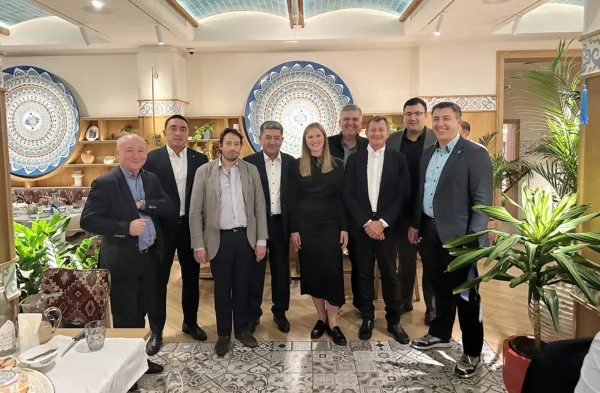A report: First ESU Course in Uzbekistan delivers robotic surgery and uro-oncology updates
Urologists from neighbouring countries Kazakhstan, Kyrgyzstan, and Tajikistan convened during the European School of Urology (ESU) course, “Robotic operations in urology and updates and highlights in uro-oncology”. The course took place on 3 October 2025 in Tashkent, Uzbekistan, during the congress of the Scientific Society of Urologists of Uzbekistan.
This year’s programme focused on two major domains: advances in robotic surgery and current updates in uro-oncology. Chair Prof. L. Lusuardi (AT) and course faculty members Prof. G. Pini (IT) and Prof. V. Spingler (DE) spearheaded the course together with the local faculty members Prof. F. Akilov (UZ), Prof. S. Mukhtarov (UZ) and Dr. Bekhzod Ayubov (UZ), exchanged knowledge, shared clinical experience, and discussed emerging developments with the participants.
Course overview
The ESU course maintained its traditional structure of concise lectures, interactive case discussions, and open debates. This multifaceted approach ensured both academic rigour and active engagement. More than 200 participants had the opportunity to interact directly with international experts, critically appraise complex cases, and contribute to discussions on evolving clinical practices.
The atmosphere was collegial and intellectually stimulating. Attendees represented various stages of professional development—from residents to senior consultants. There was a broad consensus that the course provided clinically relevant knowledge readily translatable into daily urological practice.
Impressions
A defining strength of the course was its integration of scientific evidence with practical clinical insights. Faculty members not only presented recent data but also shared personal experiences and technical nuances derived from their own surgical practice. The case-based sessions, in particular, were highly valued for encouraging participants to approach real-world clinical challenges through structured reasoning and multidisciplinary perspectives.
The discussions on technological innovation also drew significant attention. Many participants emphasised the rapid evolution of robotic surgery and its transformative impact on contemporary urological procedures. The programme underscored that continuous professional development and familiarity with novel surgical modalities are essential for maintaining excellence in patient care.
Scientific content and key takeaways
1. Robotic surgery in urology
Robotic-assisted techniques are now firmly established within urological practice and continue to expand in scope. The course provided a comprehensive overview of current applications and outcomes:
- Prostate surgery
Robotic-assisted radical prostatectomy has become the standard of care in many institutions. It achieves excellent oncological control while enhancing postoperative functional recovery, particularly with respect to urinary continence and sexual function.
- Kidney surgery
Robotic partial nephrectomy facilitates precise tumour excision with maximal preservation of renal parenchyma. This technique is particularly advantageous for managing small or anatomically complex renal masses.
- Bladder surgery
Robotic radical cystectomy with intracorporeal urinary diversion is gaining wider adoption. Reported benefits include reduced intraoperative blood loss, shorter hospitalization, and faster convalescence. Nonetheless, optimal results are achieved in high-volume centres with experienced surgical teams.
A key message reiterated throughout the course was that robotic technology, while highly advanced, is not universally applicable. Clinical success depends on appropriate patient selection, structured training, and cumulative surgical experience. The consensus view was that technology should serve as an adjunct to, rather than a substitute for, sound surgical judgment.
2. Updates in uro-oncology
The uro-oncology segment of the course addressed rapid advances across major malignancies, emphasising the shift toward individualised and evidence-based treatment strategies:
- Prostate cancer
The introduction of prostate-specific membrane antigen (PSMA) - positron emission tomography (PET) imaging has markedly improved staging accuracy, facilitating tailored treatment decisions, and minimising both over- and under-treatment.
- Bladder cancer
Immunotherapy is extending beyond metastatic disease into earlier treatment settings, with emerging data supporting its combination with surgery and chemotherapy.
- Kidney cancer
The management of advanced renal cell carcinoma is increasingly dominated by combination regimens incorporating targeted agents and immune checkpoint inhibitors, offering improved survival and enhanced quality of life.
The overarching message was that uro-oncology is progressing toward precision medicine, integrating molecular, imaging, and clinical data to optimise patient outcomes.
Conclusion
The ESU course once again demonstrated its value as a premier platform for continuing medical education and professional collaboration. Participants gained updated insights into robotic innovations, oncological treatment paradigms, and the principles of evidence-based decision-making.
By combining advances in robotic surgery with the latest developments in uro-oncology, the programme provided a comprehensive and future-oriented perspective on modern urological practice. Collectively, these discussions highlighted the ongoing transformation of urology—where technology, science, and individualised care converge to deliver improved patient outcomes.
